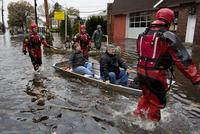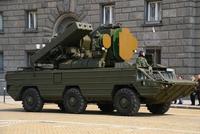-
The irreducible elements of a Freeze Plus interim agreement with Iran
Iran and the P5+1 are set to resume talks on Iran’s nuclear program tomorrow, Thursday, 7 November in Geneva.The Institute for Science and International Security (ISIS) has developed a list of what it calls “irreducible elements” which a negotiated interim agreement should aim to achieve. These four elements are: Stopping the advance of Iran’s centrifuge and Arak reactor programs; extending breakout times; capping the Iranian centrifuge program and ensuring that it will not expand beyond this cap (in terms of enrichment output) during the next 5-15 years; and increasing the chance of finding a secret centrifuge or plutonium separation plant.
-
-
FBI mulling use of video recognition technology
The Federal Bureau of Investigation(FBI) is considering the use of video recognition technology to identify suspects in videos and still images based on facial and behavioral recognition. The proposed smart-video technology would scan crime scene footage against records of people, places, and objects to highlight possible suspects and their whereabouts.
-
-
ShotSpotter helps Washington, D.C. police track gunshots
Law enforcement officers in Washington, D.C are better equipped to track and monitor gunshots in the city’s most violent neighborhoods by using ShotSpotter, a system of rooftop sensors which recognizes sounds from gunfire. Law enforcement officials can track shooting incidents and also predict locations and time of future shooting incidents by analyzing records provided by ShotSpotter.
-
-
UAV developer CyPhy Works raises $7 million to build flying robots
Danvers, Massachusetts-based CyPhy Works, a developer of advanced UAVs, the other day announced the close of a $7 million financing round led by Lux Capital, with participation from General Catalyst Partners, Felicis Ventures, and several undisclosed angel investors. As part of the financing, Lux Capital Partner Bilal Zuberi will join the CyPhy Works board of directors. The company says it targets 24/7 “persistent” operations.
-
-
Cool technology from DHS
The U.S. Department of Homeland Security (DHS) employs more than 240,000 people in a variety of areas and activities, from border security and aviation to emergency response and cybersecurity, plus everything in between. Many may not be aware of the fact that DHS has also been busy developing some cool, high-tech, life-saving gear to protect people before, during, and following disasters and emergencies.
-
-
Detecting threats in a crowd
Around a military camp situated close to a built-up area there are always people moving about. Scientists at FOI, the Swedish Defense Research Agency, have created a multi-sensor system designed to be able to detect threats by identifying unusual patterns of movement involving individuals or groups.
-
-
U.S. drone strike kills top al-Shabaab bomb maker
The U.S. military has confirmed the killing of Ibrahim Ali Abdi, also known as Anta Anta, the explosives specialist who headed al-Shabaab’s bomb-making efforts with an expertise in suicide missions, road-side explosives, car bombs, and other homemade bombs. The administration had been reluctant to follow in Somalia the punishing drone campaign it has been conducting in Pakistan and Yemen for fears that such a campaign might transform al Shabaab from a regional organization focused on repelling foreign troops – from Kenya, Ethiopia, and the African Union — from Somalia into a group which adopted al Qaeda’s agenda to strike the West at every turn. The killing of Anta, and the failed raid three weeks ago to kill another Shabaab leader, Abdulkadir Mohamed Abdulkadir, are indications that the administration has decided to escalate the fight against the Somali group.
-
-
Perspectives on terrorism and responses to it
The Strategic Multi-Layer Assessment office within the Office of the Secretary of Defense has published a new white paper, in Looking Back, Looking Forward: Perspectives on Terrorism and Responses to It Strategic Multi-layer Assessment, which offers discussions of different perspectives of terrorism and approaches to understanding the phenomenon. The papers cover topics ranging from strategic and adaptive considerations of terrorism to analytical considerations.
-
-
Resources on disaster preparedness, resilience

One year after Superstorm Sandy hit the eastern United States, local, state, and federal agencies as well as community groups and businesses are working to strengthen the U.S.s resilience to future disasters. A National Research Council (NRC) has issues a series of studies and reports, and has put together workshops and study groups, which should advance the national conversation on preparedness and resilience.
-
-
Israel destroys advanced Syrian missiles on their way to Hezbollah

Israel Air Force (IAF) planes on Wednesday night attacked and destroyed two military bases in Syria – one near Damascus and the other in Snobar Jableh, thirty kilometers south of the port city of Latakia. The Syrian military was preparing two large shipments of surface-to-air missiles – advanced versions of the SA-8 Gecko and S-125 Neva/Pechora – for delivery to Hezbollah. The IAF destroyed the missiles before they were loaded onto truck for the trip to Lebanon. Wednesday’s night attacks were the sixth and seventh attacks Israel launched against Syrian shipments of advanced arms to Hezbollah. The earlier five attacks took place on 30 January, 3 May, 5 May, 5 July, and 18 October.
-
-
Senate panel’s NSA curbs not enough: critics
Yesterday, the Senate’s intelligence committee approved by an 11-4, and released the text of, a bill which would scale back the NSA’s bulk collection of Americans’ telephone records, increase congressional and judicial oversight of intelligence activities, and create 10-year prison sentences for people who access the classified material without authorization. Critics of U.S. surveillance programs and privacy rights advocates said the bill does little, if anything, to end the daily collection of millions of records that has spurred widespread demands for reform.
-
-
Court: a warrant is required for GPS tracking of suspects’ vehicles
A federal appeals court in Philadelphia has ruled that law enforcement officials must obtain a warrant before attaching a GPS device to a suspect’s car.The appeals judges said that “A GPS search extends the police intrusion well past the time it would normally take officers to enter a target vehicle and locate, extract, or examine the then-existing evidence.” They also pointedly noted that “Generally speaking, a warrant-less search is not rendered reasonable merely because probable cause existed that would have justified the issuance of a warrant.”
-
-
Improving earthquake early warning systems
Earthquake early warning systems may provide the public with crucial seconds to prepare for severe shaking. For California, a new study suggests upgrading current technology and relocating some seismic stations would improve the warning time, particularly in areas poorly served by the existing network — south of San Francisco Bay Area to north Los Angeles and north of the San Francisco Bay Area.
-
-
U.S. tech companies increase lobbying efforts related to surveillance, NSA
Technology firms Apple, Google, Facebook, and Microsoft, among other tech powerhouses, are quietly increasing lobbying efforts directed at government surveillance laws as they seek to have a say in what Congress does regarding surveillance reforms and National Security Agency (NSA) programs. Traditionally, tech firms have not pushed for restrictions on the ability of the U.S. intelligence community to collect data, and it is not clear what position these industry leaders will take, whether they plan to take a position at all, or whether they will present lawmakers with a united industry front.
-
-
Start-ups offer law enforcement innovation, flexibility, and low prices
Start-ups offer innovation and flexibility in addition to lower price points. The influx of start-ups into the law enforcement and security supply market is in its early stage, and while few start-ups have begun to compete with traditional, and much larger, players, law enforcement units appear to be attracted to the innovation and lower prices offered.
-
More headlines
The long view
Factories First: Winning the Drone War Before It Starts
Wars are won by factories before they are won on the battlefield,Martin C. Feldmann writes, noting that the United States lacks the manufacturing depth for the coming drone age. Rectifying this situation “will take far more than procurement tweaks,” Feldmann writes. “It demands a national-level, wartime-scale industrial mobilization.”
How Male Grievance Fuels Radicalization and Extremist Violence
By Haily Tran
Social extremism is evolving in reach and form. While traditional racial supremacy ideologies remain, contemporary movements are now often fueled by something more personal and emotionally resonant: male grievance.
The Surprising Reasons Floods and Other Disasters Are Deadlier at Night
By Kate Yoder
It’s not just that it’s dark and people are asleep. Urban sprawl, confirmation bias, and other factors can play a role.
Why Flash Flood Warnings Will Continue to Go Unheeded
By Rebecca Egan McCarthy
Experts say local education and community support are key to conveying risk.
